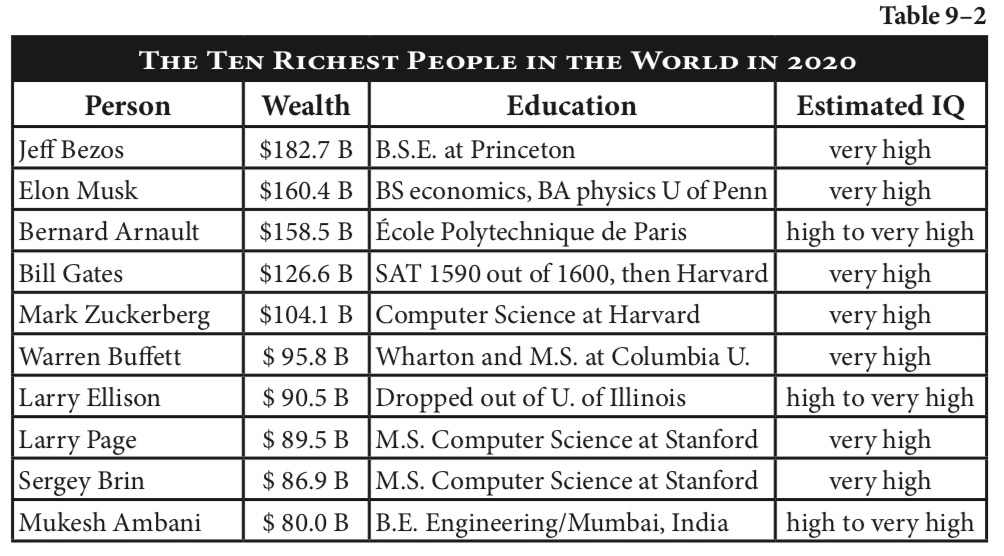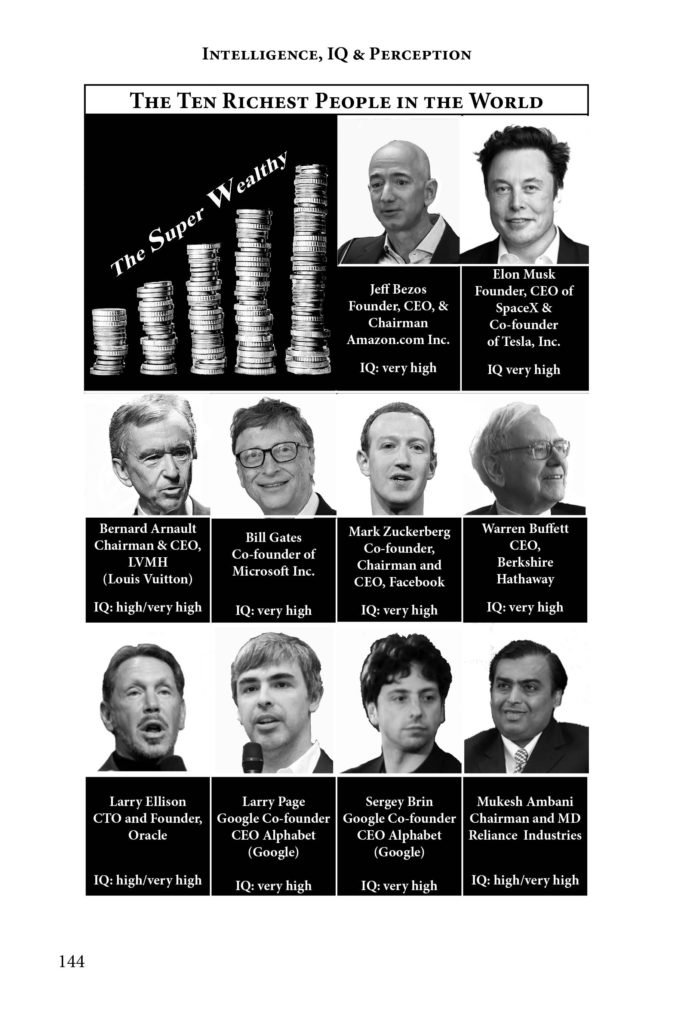Yesterday, we posted Brian White’s answer to the question, “What are the chances of someone of IQ 125 becoming a billionaire? Mr. White provided information substantiating the claim that most self-made billionaires are among the high to very high intelligence group. My research confirms Mr. White’s assertion, but it also reveals that those of extremely high IQ, the so-called “smartest” humans seldom reach billionaire status. What follows is an excerpt from chapter 9 of my upcoming book, Intelligence, IQ, & Perception: Popular Myths and Unpopular Truths.
On March 24, 2021, Forbes Media posted on its World’s Real-Time Billionaires website, the world’s wealthiest billionaires from “richest to poorest,” updated to the end of the prior stock-trading day. As we might expect, these megawealthy individuals belong to the high-IQ group. Table 9–2 displays the net worth and the educational backgrounds of the top 10 in the rich list–most of them having specialized in mathematics and computer science. Their IQs are estimated from their scholastic records, SAT scores, and the calibre of the universities at which they were accepted. Where SAT scores are unknown, the institution at which an applicant is accepted is a reasonably good indicator of his SAT score and, in turn, his IQ.


Jeff Bezos, identified as “gifted” in elementary school, was accepted at Princeton and subsequently graduated summa cum laude in electrical engineering and computer science.
Elon Musk earned degrees in Economics and Physics and was enrolled in a Ph.D. program at Stanford before dropping out to found his first company.
Bernard Arnault studied at the prestigious École Polytechnique de Paris where he received a BA in engineering. In 1985, he bought Christian Dior using $15 million from his father’s construction company and went on to build the luxury goods group LVMH that includes Louis Vuitton and Sephora.
Bill Gates, with a reported IQ of 160, achieved a near perfect score of 1590 out of 1600 on his SATs and was accepted into Harvard where he studied law, mathematics, and computer science.
Mark Zuckerberg, like Bezos, was identified as gifted early in his career and won prizes in mathematics, physics, and astronomy while attending the prestigious Phillips Exeter Academy in New Hampshire. While a student at Harvard University, he developed the Facebook software that would become his signature creation and make him a billionaire at age 23.
Warren Buffet attended the Wharton School of Economics, where he studied for 2 years before transferring to the University of Nebraska from which he graduated at age 19. He subsequently earned a Master of Science degree in Economics at Columbia University.
Larry Ellison’s IQ is also somewhat difficult to estimate because he dropped out of the University of Illinois at Urbana-Champaign and the University of Chicago before completing a degree. However, his development of the computer software company, Oracle Systems Corporation, and his subsequent business mergers and consolidations suggest that he also has a high or very high IQ.
Larry Page’s father was a computer science professor at Michigan State University where his mother taught computer programming. Following a stellar academic career that brought him to Stanford, Larry predictably pursued a Ph.D. in computer science. His thesis supervisor Terry Winograd suggested that he investigate how the articles on the World Wide Web were linked. Pursuing this suggestion, Page embarked on a project he called “BackRub” that would trace each page on the web back to its antecedents. This would eventually enable the identification of the seminal sources from which the other links emerged. Excited by the challenge of the BackRub project, fellow Ph.D. student Sergey Brin joined the project and the two massaged BackRub into what we know today as Google–a system for organizing the world’s information base that has been described as “the most empowering invention since Gutenberg’s printing press.”5
Mukesh Ambani is the least known billionaire in this rogue’s gallery of the world’s richest, though at the time of the Forbes publication, he was the richest person in Asia. Mukesh received his BE degree in Chemical Engineering from the Institute of Chemical Technology in Mumbai, and enrolled in the MBA program at Stanford. However, in 1981, he dropped out to return to India to help his father build the fledgling Reliance Industries Ltd. into a world-class corporation that expanded from the production of polyester filament yarn, into oil refinery and petrochemical production.
This brief survey of the ten wealthiest people in the world reaffirms the old adage, “there is no substitute for brains.” All of these men, (except possibly Arnault who received money from his father’s business) were self-made billionaires with high or very high IQ’s, confirmed or inferred. Brilliant inventions and technological breakthroughs that generate megawealth seldom, if ever, come from those of low or mediocre IQ. A review of the other top-ranked billionaires in the rich list reveals that those who have accumulated (rather than inherited) great wealth are overwhelmingly drawn from the ranks of those with so-called “book smarts,” even though the applications of their intelligence may appear to be very practical and removed from an academic context.
Yet, as brilliant as these entrepreneurs are, there are others who register higher on the “book smarts” scale. In the following sections, we will answer the question “What becomes of those who reside in the IQ stratosphere–the smartest and brightest–as they move through life?”
The short answer to the original question, is that while the probability of becoming a billionaire is slim, there are many people in Forbe’s list of the world’s billionaires whose IQ is no greater than 125.

Thank you for your very interesting article, I had a question. I took Raven’s intelligence test(https://esanj.ir/ravens-progressive-matrices-test), which test is this intelligence based on?
Hi Reza. I think that test is a general test of your intelligence. It will measure, among other things, your ability to identify patterns and to generalize ideas.